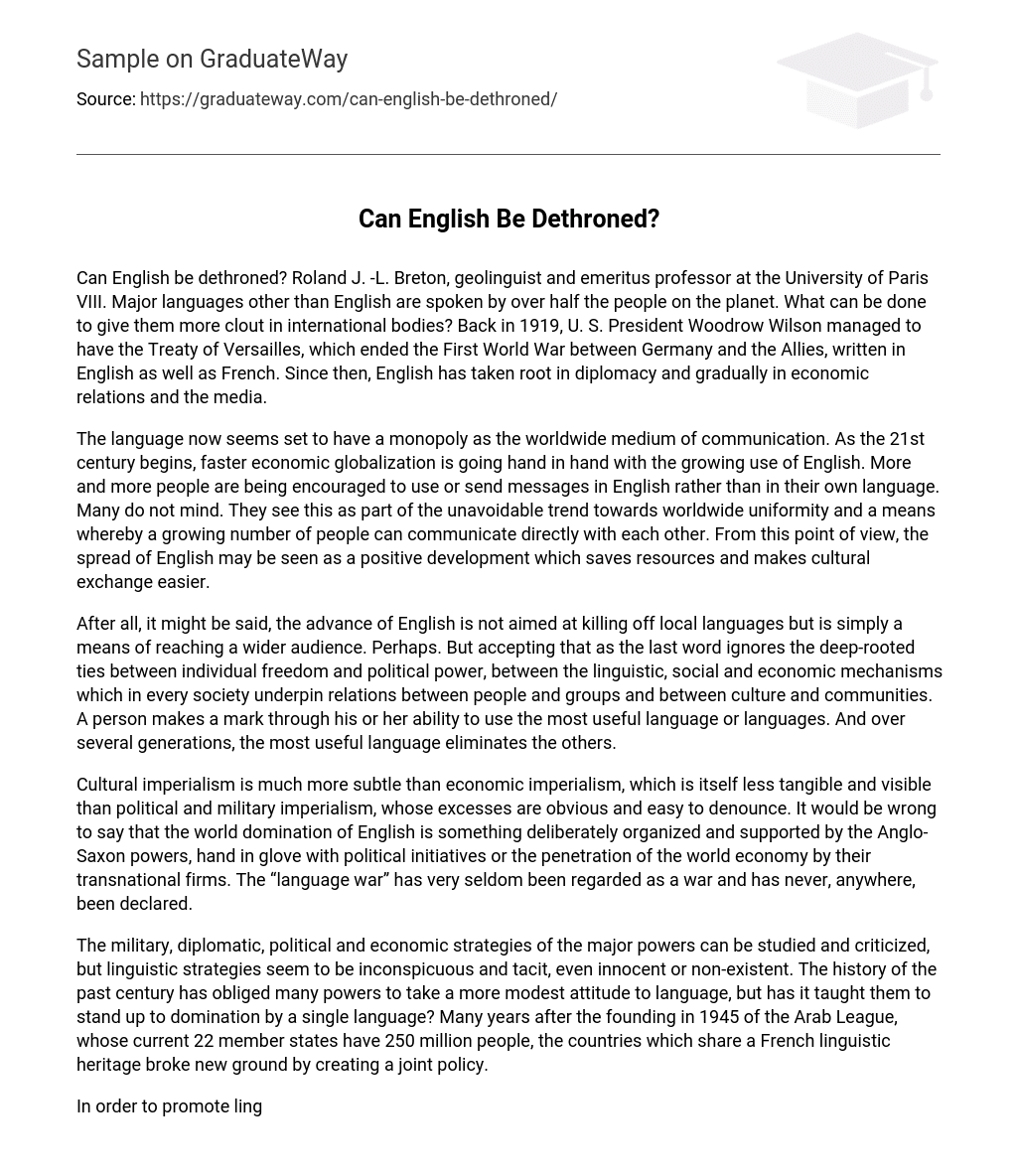Can English be dethroned? Roland J. -L. Breton, geolinguist and emeritus professor at the University of Paris VIII. Major languages other than English are spoken by over half the people on the planet. What can be done to give them more clout in international bodies? Back in 1919, U. S. President Woodrow Wilson managed to have the Treaty of Versailles, which ended the First World War between Germany and the Allies, written in English as well as French. Since then, English has taken root in diplomacy and gradually in economic relations and the media.
The language now seems set to have a monopoly as the worldwide medium of communication. As the 21st century begins, faster economic globalization is going hand in hand with the growing use of English. More and more people are being encouraged to use or send messages in English rather than in their own language. Many do not mind. They see this as part of the unavoidable trend towards worldwide uniformity and a means whereby a growing number of people can communicate directly with each other. From this point of view, the spread of English may be seen as a positive development which saves resources and makes cultural exchange easier.
After all, it might be said, the advance of English is not aimed at killing off local languages but is simply a means of reaching a wider audience. Perhaps. But accepting that as the last word ignores the deep-rooted ties between individual freedom and political power, between the linguistic, social and economic mechanisms which in every society underpin relations between people and groups and between culture and communities. A person makes a mark through his or her ability to use the most useful language or languages. And over several generations, the most useful language eliminates the others.
Cultural imperialism is much more subtle than economic imperialism, which is itself less tangible and visible than political and military imperialism, whose excesses are obvious and easy to denounce. It would be wrong to say that the world domination of English is something deliberately organized and supported by the Anglo-Saxon powers, hand in glove with political initiatives or the penetration of the world economy by their transnational firms. The “language war” has very seldom been regarded as a war and has never, anywhere, been declared.
The military, diplomatic, political and economic strategies of the major powers can be studied and criticized, but linguistic strategies seem to be inconspicuous and tacit, even innocent or non-existent. The history of the past century has obliged many powers to take a more modest attitude to language, but has it taught them to stand up to domination by a single language? Many years after the founding in 1945 of the Arab League, whose current 22 member states have 250 million people, the countries which share a French linguistic heritage broke new ground by creating a joint policy.
In order to promote linguistic, economic and political co-operation, they set up the International Organization of French-Speaking Countries, which (like the Commonwealth) embraces more than 50 countries with over 500 million inhabitants. Since 1991, there have been conferences of Dutch-speakers from eight or more communities representing some 40 million people, as well as Ibero-American summits, which every two years bring together more than 20 countries (350 million inhabitants).
Turkish-speaking summits have been held biennially since 1992, with delegates from six independent countries (120 million people) of Europe, Central Asia and small ethnic communities elsewhere. Since 1996, the Association of Portuguese-speaking countries has brought together people from seven countries (200 million people). Pockets of resistance Will unco-ordinated resistance by the world’s most widely-used languages be enough to cope with the threat of cultural uniformity?
Perhaps not, since each language has its own geographical sphere in which it is used with varying degrees of competence. If you add up the number of speakers of the world’s dozen most-used languages, you come up with a figure of more than three billion—half of humanity—which easily surpasses the two billion for whom English is more or less the official language (the Commonwealth and the United States). Backed by a concerted strategy, these major languages would surely make headway in international institutions. It is not just the future of the world’s major languages that is at stake.
Further down the scale are 100 or so tongues officially recognized by governments or sub-national regions, such as the constitutional languages of India and the languages of the Russian nationalities. These languages have their place and a right to defend it. At the bottom of the scale are thousands of sometimes struggling languages variously called native, minority, communal or ethnic tongues. Most are in danger of disappearing. They are spoken by some 300 million people. Will minor languages die out, as some predict? Yes, because the best way to kill off a language is to teach another one.
The monopoly that about 100 national languages have on education makes it inevitable that languages not taught in schools will be confined to the home and to folklore and eventually be pushed out of nurturing cultural environments. Language murder or “linguicide”, whether it is carried out intentionally or not, is one of the basic tools of ethnocide, of the deculturation of peoples which has always been perpetrated by colonization and is still the semi-official aim of governments which do not recognize the rights of their native ethnic minorities.
As local languages are increasingly excluded from education systems, “linguicide” is speeding up. The language issue in the 21st century raises two questions. How can widely-used or national languages resist the encroachment of English? And how can minority languages in danger of extinction be saved and gain access to development?





